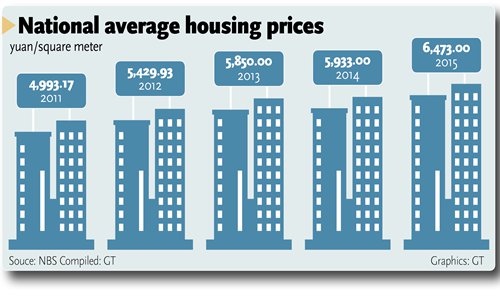
(Graphics/GT)
Order from the top to ensure prices remain stable, supply matches demand
The Political Bureau of the Central Committee of the Communist Party of China has urged the establishment a long-term mechanism to ensure the healthy development of the housing market in China.
Experts say the move is intended to relieve the economy's heavy dependence on real estate.
China will stick to the basic theme of "seeking progress while maintaining stability" for its economic work in the second half of 2017, the Xinhua News Agency reported, citing the meeting of the Political Bureau of the CPC Central Committee on Monday.
The meeting, presided by Xi Jinping, general secretary of the CPC Central Committee, stressed that the main focus of the latter half of this year will be implementing a proactive fiscal policy and prudent monetary policy with supply-side structural reform, according to Xinhua.
Meanwhile, it will step up efforts to build a "long-term effective" mechanism to ensure the stability of the housing market.
"It's not a short-term target, which is easily affected by market volatility," Chen Zhi, secretary-general of the Beijing Real Estate Association, told the Global Times on Tuesday.
In the past decade, the booming housing market has become a pillar for the economic growth in China, touching on many determinant factors such as land supply and local fiscal revenues, Chen noted. "To build a long-term mechanism requires deepened reforms, which will be a long process to balance the interests of governments, enterprises and numerous households," he added.
More measures should aim at "liquidizing land assets" and maximizing their yields in first-tier cities, while tackling the "overheated" housing market in second-tier cities, media reported in May, citing an annual report on China's real estate issued by the Chinese Academy of Social Sciences on May 9.
The rapid growth has "overdrawn" domestic consumers, which will harm the development of the real economy.
The average price of residential commercial houses nationwide recorded its fifth-consecutive-yearly increase in 2015, to 6,473 yuan ($959) per square meter, up 9.1 percent from 2014.
The meeting of the Political Bureau of the CPC Central Committee emphasized that "the housing market has to be stable," which means no significant ups and downs in prices, Yan Yuejin, a research director at the Shanghai-based E-house China R&D Institute, told the Global Times Monday. "It has to maintain a stable relationship between supply and demand," he said.
China has begun a new round of tightened policies on the housing market since last year. One aspect of the tightening is to control home prices in first- and second-tier cities and the other aspect is to reduce inventory in third- and fourth-tier cities, Xing Zhihong, spokesman of the National Bureau of Statistics, was quoted as saying in a press conference on July 17. "Local governments have imposed restrictions on home purchases, sales and mortgage applications as well as increased the land and housing supply," Xing noted.
Reduce dependence on real estate
When President Xi said houses are for people to live in, not for people to speculate, this warning was sent out to local governments. The real estate sector is a major financing channel for local governments' fiscal revenues, and a major engine for local economic growth, Chen noted. "This has to be changed, and we need more reforms in both business and administrative practices," Chen said.
Local governments played a key role in the recent growth of the property sector in China, as stringent GDP targets and the need to provide for social services and infrastructure investment pushed local governments to sell vast amounts of residential land to generate revenue, UBS said in a report published in February 2016.
The real estate sector was estimated to have contributed nearly 6 percent of GDP in 2014, according the UBS report.
"Only blaming local governments is not fair. Look at our money supply, which has been growing much faster than GDP," Chen said, adding that a loose monetary policy, which has raised household leverage, made more hot money flow into the real estate sector.
The mechanism should cut off financing channels for speculators and lower the value added by housing transactions, Xinhua reported Tuesday. More funds should be rechanneled to fields other than the property sector. Details of the long-term effective mechanism still need to be developed, the report said.


















































